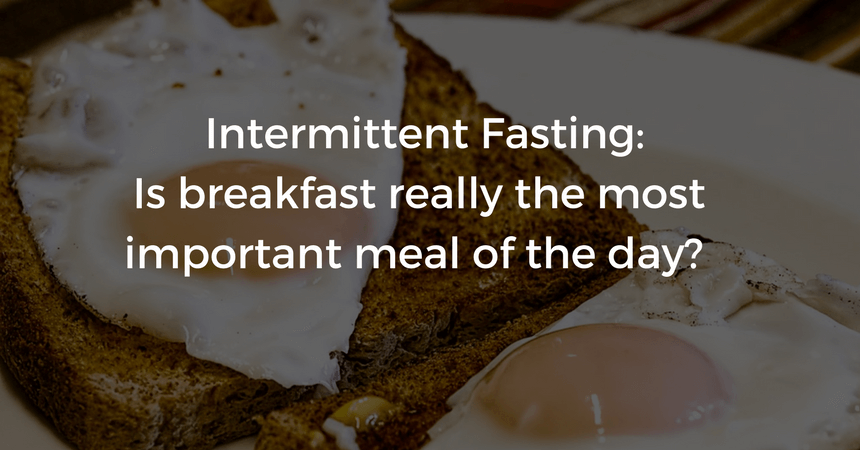Table of Contents
Grab our free Intermittent Fasting starter guide to skip breakfast AND burn fat at the same time. (Yes, you read that right.)
We’ve all heard the saying breakfast is the most important meal of the day and we’ve never really questioned it.
All because somebody once said that there was a link between skipping breakfast and obesity.
So we all panicked and started eating breakfast religiously. Until now…
Why you ask? Well, it turns out that there isn’t any scientific research that confirms this link between obesity and skipping breakfast.
To sum that up perfectly, in the wise words of Dr Mercola,
“contrary to popular belief, breakfast is not the most important meal of the day.”
In fact, what if I told you that skipping breakfast could help your body to burn more fat?
Oh, now you’re interested?
I introduce to you intermittent fasting!
(Want to save some time and download our free guide to intermittent fasting? >>Click here<< to grab it now

What is intermittent fasting?
It’s not a hunger strike. It’s also not an indefinite fast. It’s essentially planned cycles of eating and fasting.
It’s a gradual process to change the amount of food your body can intake at one time. As your body adjusts, you’ll be able to maintain your nutrient intake.
When we fast, our bodies break down stored fat so that it can be used as energy. For those trying out the ketogenic diet, you’ll be familiar with this because when in ketosis, your body already mimics a fasting state which helps with the fat burn.
Intermittent fasting techniques
According to Mark Sisson, with his popular blog, Mark’s Daily Apple, there are many different types of intermittent fasting.
Mark lists a number of different techniques of using intermittent fasting and recommends that you listen to your body to find out which is right for you.
First, there’s the skipped meal. As the name suggests, you skip a meal during the day. Instead of forcing yourself to eat because the clock says it’s lunch time. Rather listen to your body, if you’re not hungry, skip it.
Next, he mentions the condensed eating window. This is where you consume your day’s food in a set number of hours. You avoid snacking or drinking anything other than water during the fasting period. This seems to be quite a popular technique amongst those in the fasting know-how.
Next up, we have the early and late technique. With our fast-paced daily lives, this one may be easier to manage than the condensed eating window technique. Here you get your daily food intake from just two meals, one early morning meal and one late afternoon meal. (So, just breakfast and dinner really.)
Then we have the twenty-four hour fast. This is where you fast for a full twenty-four hours, possibly on a weekly or a monthly basis.
If you’re not too keen to fast completely initially, some suggest including once cup of bulletproof coffee in the morning. Fats from the butter and the brain octane oil ensure a stable energy supply.
So breakfast isn’t all that?
In short, no, breakfast is not all that. In fact, that whole ‘traditional’ meal plan thing is not all that.
We always used to be told that eating breakfast speeds up your metabolism. But according to Jeremy DuVall, this is one of the most common myths used against intermittent fasting. And it is just that, a myth.
The truth is, how frequently you eat doesn’t have much to do with your metabolism. The quality and quantity of your food is far more important in influencing your metabolism.

The benefits of intermittent fasting
1. Fat burning
According to Dr Mercola, research on the effects of intermittent fasting have shown positive results for weight loss. The reason, he explains, is that fasting promotes the secretion of human growth hormone, which is really just a fat-burning hormone.
The more fat burning hormones you have, the more fat you’ll be burning. It’s as simple as that. This is a reason why people who using intermittent fasting will lose weight without actually changing what, or how much they’re eating. The key here is timing your meals.
A ‘normal’ eating schedule doesn’t allow your body to enter into a fasting state and that’s where the magic happens!
2. Insulin resistance
Kris Gunnars, suggests that:
“Intermittent fasting has been shown to have major benefits for insulin resistance and lead to an impressive reduction in blood sugar levels.”
Being in a state of fast gives your body more practice at burning fat. (And we all know that practice makes perfect!) This is combined with reduced insulin and glucose levels.
In addition to reducing insulin levels, a study on diabetes in rats shows that intermittent fasting could also protect against kidney damage, a severe complication faced by diabetes sufferers.
3. Heart disease prevention
Gunnars also suggests that intermittent fasting can improve a number of risk factors associated with heart disease. Including blood pressure and cholesterol levels.
4. Brain health
Just in case you needed another reason, intermittent fasting is great for your brain health and cognitive functioning. A number of neurochemical changes take place when we put ourselves into a state of fasting.
Speaking about the effects of intermittent fasting, a neuroscientist, Dr Mattson, states that:
“it improves cognitive function and stress resistance, increases neurotrophic factors and reduces inflammation.
He also suggests that a state of fasting helps the production of new nerve cells and stimulates the production of ketones.
(I’m guessing that by now you too are throwing your ‘traditional’ meal plan out the window.)
What you need to know
There are some restrictions on those who shouldn’t try out intermittent fasting.
Young children as well as pregnant and breastfeeding women are generally advised to avoid fasting.
There really are a number of different ways to build intermittent fasting into your diet. Something that’s important to remember is that it’s a lifestyle change. It needs to be a healthy eating plan combined with fasting.
If you’re fasting and then gorging yourself on sugary treats, you’re kind of missing the point here.
You can also start gradually. Baby steps some may say.
Dr Mercola suggests starting by fasting for just three hours before bed every night. When you wake up try and extend the time until you eat breakfast. Then gradually, extend the fasting period until you’re able to skip breakfast entirely.
This will take some time. So be patient with yourself and do what makes you feel good.
If you’re sticking to the good, healthy foods, and you add some intermittent fasting to your diet, you may be surprised by the health benefits. You’ll soon improve your metabolic rate and start burning fat.
Ready to get started?
Grab your full Intermittent Fasting Starter Guide for FREE right here!
This guide is available to download by clicking the link above.

Free Shipping
On orders over $149$14 Flat Rate Shipped fast and Australia-wide